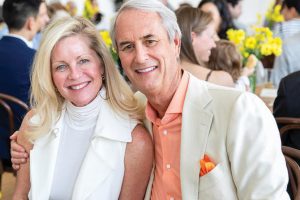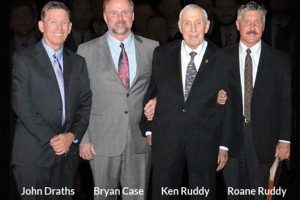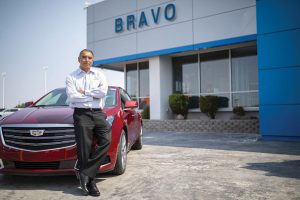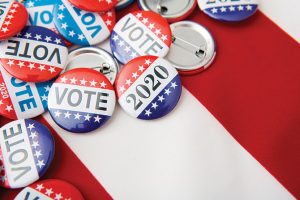By The Texas Automobile Dealers Association
TADA chair Nancy Harper appointed Bryan Case Sr. as the TADA legislative chair for the 2021-2022 session. He has already served as the chair for the 2020-2021 session. Bryan lives in Beaumont and is the dealer for Classic Southeast Texas. He received the 2019 Key Director Award from Richard Karr at the 103rd Annual TADA Conference. The award recognizes the member of the TADA board of directors who has contributed the most to the organization’s success.
Tell us about becoming TADA’s legislative chair. How did you become interested in politics?
I became interested in the TADA, if you can call my involvement there as politics, because I felt strongly that the TADA was the first and best line of defense against the encroachment on the franchise system in Texas
by manufacturers.
Why are you interested in the TADA legislative committee?
I felt the committee was the tip of the spear, so to speak, in its mission to protect the dealer body.
What are your goals while serving in this position?
Although we initially had a list of goals in February, we have adopted a mindset of flexibility due to the uncertainty associated with the COVID situation. There’s still a lot of unanswered questions about the upcoming session at the state capitol. At this point, I’m waiting to see what we can accomplish effectively while dealing with this unusual set of circumstances.
What are the current dominant trends in the automotive industry, and where do you think the automobile industry is going?
The transition to digital marketing has become accelerated during the COVID-19 crisis. Going forward, that is going to continue to be a key trend. The rollout of electric vehicles during the next five years is also going to be one of the dominant topics both at the dealer level and at the state level as we all figure out how they will fit into our current business model. Although I also believe autonomous cars are going to be an issue, in my opinion, it’s not part of the short-term outlook.
What is one of the most important issues you’ve contributed to? Is there a particular legal or legislative win you’ve seen?
One of the things I’m most proud to have participated with the board on was in the last session, when we resolved the loaner-agreement issue between dealers and insurance companies. Insurance companies had tried to shift insurance liability to dealerships any time our customers were in loaner vehicles. We were able to put that back where it belonged.
These are undoubtedly unprecedented times. What are you doing, as a dealership, to weather the storm?
We are putting more emphasis on preowned sales as well as fixed operations. New sales have slowed due to the lack of available inventory. There has been a definite uptick in folks who have put off a purchase and repaired their vehicles instead.
What are you doing to support your employees?
We’ve tried to be flexible to avoid layoffs and to be understanding with work schedules that center around child care and school issues. We’ve also had to be flexible with our team members who have had to act as caretakers. At the end of the day, we want to treat everyone the same way we would want to be treated. These are unusual times, people are doing their best, and we need to do the same.

What are two things that you have learned from past experiences that are helping you navigate now?
Things are never as bad or as good as they appear to be initially. Like all changes, the pandemic is going to pass at some point. I try to share that perspective with our staff whenever possible. That said, the things we learned about expense control during the Great Recession have helped us be better prepared for this. We’ve also been focused as much as possible with employees because we’ve learned that good communication builds buy-in and stability.
What effect do you think the pandemic will have on the auto industry going forward?
It’s going to be a slow recovery. At the same time, there’s going to be some pent-up demand after the elections are behind us. People have delayed purchasing because of uncertainty in the news. Some of the changes that have taken place, such as moving as much of the purchase online as possible, are not going to stick around completely in the long term. People are going to return to the showrooms and buy vehicles in person. They still will want to see and drive them, so there’s going to be a return to normalcy once people feel safe again doing that.
What is the takeaway for you as a leader from this extraordinary experience that will guide your future business decisions?
I believe we have an opportunity to exhibit leadership skills for some of the younger managers who do not have the same breadth of experience dealing with crises. We can set the pace and the example. Younger employees tend to take the cue from the more senior leaders; they look at our outlook and how we react to uncertainty and adversity.
I do feel good about the younger generation that is rising through the ranks. They show the same resilience that a lot of us had at that age, and it is heartening to see that.
What are you and your dealerships doing for community outreach?
General Motors has run a promotion for first responders, which I fully support. In the past, we’ve done all the standard stuff that people expect. We usually sponsor 8-10 different events a year, and we also sponsor leagues and teams. There’s an annual food drive our team puts on at Thanksgiving, and we’ve often partnered with the local police department to buy bikes for children. We call it Blue Santa. Unfortunately, most of these things have been canceled this year, so we are constantly looking for other ways to serve and give back to the community.
Once the election is behind us, and things calm down politically and in the media, we should be able to get back to some sense of normalcy. We are hoping to resume our regular schedule of events in the spring.
Describe your educational background. What did you study?
I studied to be an electrical engineer. I ended up in the car business instead.
How did you become a dealer? Did you always aspire to be a part of the auto industry?
No, becoming a dealer was never part of the plan. I had taken a job in the service department at a local dealership in Austin to help with school but never dreamed I would become a dealer or make a career of it.
How has coming up through the service department side of dealerships affected your leadership approach?
I grew up on a farm and ranch in central Texas, where we worked on all our own equipment. That’s how I started working on equipment and engines. We had to maintain and repair everything that we used, so it was essential to survive.
It’s somewhat rare to start in the service department and eventually become a dealer, but that’s what happened. I got a job at a local dealership in Austin, and coincidentally at the time, electronics were first being introduced in cars. Because of my training in electronics, I was able to diagnose and repair issues that the technicians at that time hadn’t been trained on. Suddenly I was making more than I could make with my degree at an electronics firm. I liked working on cars, liked the business and most importantly the people. I decided to give it a try, and here I am today.
As far as leadership is concerned, I feel like I have a duty and responsibility toward helping others because of the investment that so many other people made in me. There are a number of people who helped me along my journey, and without their help, I wouldn’t be here today.
Are there any specific individuals who had a major impact on your career? How?
I’ve been blessed in that I have worked for only a handful of dealerships. The most important person I met along my journey, hands down, was Ken Ruddy from Beaumont. At the time, he had just bought a single-point Oldsmobile dealership in Round Rock when I went to work for him. His business grew, and I grew with him. Eventually, many years later, I was fortunate in that he offered me a chance to buy into the business.
Ken Ruddy was by far the biggest influence on me and my career, and he was very instrumental to me in pursuing my dream because of the deep respect I developed for him. Ken was a rare individual. He graduated from West Point and was a decorated military veteran. But even more importantly, he was a man of high moral character and integrity. If he shook your hand after agreeing to a deal, you could depend on that handshake. That’s a rare thing in today’s world. Watching him through the years, I became firmly convinced this was where I wanted to be. He set the standard that I still work to achieve every day I go to work.
What’s the most rewarding part of your career?
It’s helping employees grow and reach their potential. I enjoy seeing others achieve their goals and work toward their dreams.
How has the automotive industry changed in the last five years?
There’s been an overall improvement in the dealers who have survived and worked through the Great Recession. Out of that experience, you are seeing dealers now who are more likely to react positively to change when it comes. And change always comes.
What have been some of the major challenges in creating a balance in customer dealership and digital-based transactions?
There’s going to be a higher use of digital practices online for researching the purchase of a vehicle, but I don’t think you are ever going to see a time when people don’t want to come in and look at a car on the lot. They instinctively want to touch their new car and drive it before they buy it.
If there’s a major challenge, it’s for us to be receptive to hearing what the customer wants and then giving it to them. Sometimes we think we know what the customer wants versus what they tell us, but in the end, they vote with their pocketbook.
What is the biggest impact of being a TADA member?
I appreciate all the effort the TADA goes to for its members. Over time, I have come away with a deeply
appreciative view of my fellow dealers. Many of them work tirelessly behind the scenes. They aren’t doing it for pay or recognition. They are doing it because it is the right thing to do. I respect this group because they helped me improve and be a better leader as well.
Are you involved in any civic or charitable organizations?
I’m active with my church. We have small-member disciple groups where we mentor individuals. I lead one group and work with the men in it during my spare time.
If you look back at your career and life, what would be three things that you have learned and that you would pass on to a younger member within the automotive industry?
I would share this one lesson or thought. Intelligence or education is not the only asset you have, or always the most important. Being persistent, not quitting and not giving up are more important qualities in the long run. Don’t feel like you can’t succeed because maybe you don’t have the best pedigree or your family doesn’t come from the car business. It’s about making an effort, doing the work and improving yourself and associating with people who are going to better you and who see you as a worthwhile investment.
What are some professional moments that make you the proudest?
It’s been the addition of having my two oldest sons work with me in the business. They are both general managers, and each runs a store for the group.
Was there an “aha” moment in your career that defined you?
There was a moment like that in my career. In 1990 or 1991, before I was a dealer, I had become somewhat disillusioned with the business. I was working in a very large metro store as a service director, and I had a supervisor who I did not feel was on the same level as me from the standpoint of character or integrity. I did not respect him. And at the same time, we were growing fast. I felt overmatched, and I knew that if I had to emulate my direct supervisor at that time to be successful and to advance, then this wasn’t the job for me.
My hero in the story was the GM of that store. I walked into his office and told him I was quitting on two different occasions and actually turned in my notice. He talked me out of it both times and told me, “You are the right guy for the job. You need to stick this out.” He assured me of his confidence. He said, “Work through this, and you will be better when you get to the other side.” I took his advice and stuck it out. Ultimately, it was the other supervisor who ended up doing something different.
After that lesson, I never looked back when facing adversity.
It impressed upon me that we all have to learn how to serve before we can learn how to lead. You may not always like who you are following, but short of violating your moral code, you follow. And you don’t ever give up.
What is your favorite way to spend your free time? Do you have any unusual hobbies?
I’m a pilot, and I like to fly. I have a small general aviation airplane that my wife and I use to travel. I enjoy flying because it is something outside of the car business that I can also learn and grow in.
Also, I have some property in the country, and I enjoy working there, too, doing ranching stuff. Sometimes I can get saturated with people, so I am always happy when I am out in the country working on a tractor, by myself, without a phone.
Finally, I enjoy spending time with my family. I have five children and five grandchildren. A couple of my children work for me, and we are very blessed in that regard because we get to see each other and work together. I love my grandchildren, too. I would have just skipped to being a grandparent if I’d known how great they were going to be. I enjoy being with them so much; that’s my biggest reward.
The Texas Automobile Dealers Association
This story appears in Issue 5 2020 of the Dealers’ Choice Magazine.







